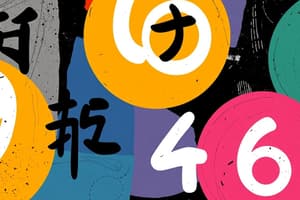Podcast
Questions and Answers
-kun
-kun
This suffix is used at the end of boys' names to express familiarity or endearment. It is also used by men among friends, or when addressing someone younger or of a lower station.
-chan
-chan
This is to express endearment, mostly towards girls. It is also used for little boys, pets, and even among lovers.
-sama
-sama
This is one level higher than '-san' and is used to confer great respect.
Sempai/Senpai
Sempai/Senpai
-dono
-dono
Bozu
Bozu
Kohai
Kohai
Sensei
Sensei
-san
-san
The lack of honorific means that the speaker has permission to address the person in a very intimate way, which is known as ______.
The lack of honorific means that the speaker has permission to address the person in a very intimate way, which is known as ______.
Flashcards are hidden until you start studying
Study Notes
Japanese Honorifics Overview
- Honorifics are important in Japanese culture, conveying respect and relationship dynamics.
-kun
- Used for boys’ names, indicating familiarity or endearment.
- Commonly employed among male friends or towards younger individuals and those of lower status.
-chan
- Expresses endearment, primarily for girls and small boys.
- Also applicable to pets and used among romantic partners.
-sama
- A highly respectful suffix, more elevated than "-san."
- Conveys deep respect and honor towards the addressee.
Sempai/Senpai
- Denotes a senior member in a group or educational setting.
- Underclassmen address upperclassmen as "sempai."
-dono
- Derived from "tono," meaning "lord," it signifies even greater respect than "-sama."
- Used in very formal contexts.
Bozu
- An informal term for a boy, akin to "kid" or "squirt" in English.
- Often used casually among peers.
Kohai
- Refers to juniors or newcomers in various settings, opposite of "sempai."
- Indicates a lower status relative to the speaker.
Sensei
- Literally means "one who has come before."
- Used to address teachers, doctors, or masters in specific arts, indicating reverence for their expertise.
-san
- The most common honorific, equivalent to Mr., Miss, Ms., or Mrs.
- A neutral term indicating respect without additional intimacy.
Yobisute (無呼称)
- Absence of an honorific implies permission for intimate addressing.
- Reserved for family, spouses, or very close friends; can be gratifying if earned, but insulting if used prematurely.
Studying That Suits You
Use AI to generate personalized quizzes and flashcards to suit your learning preferences.




